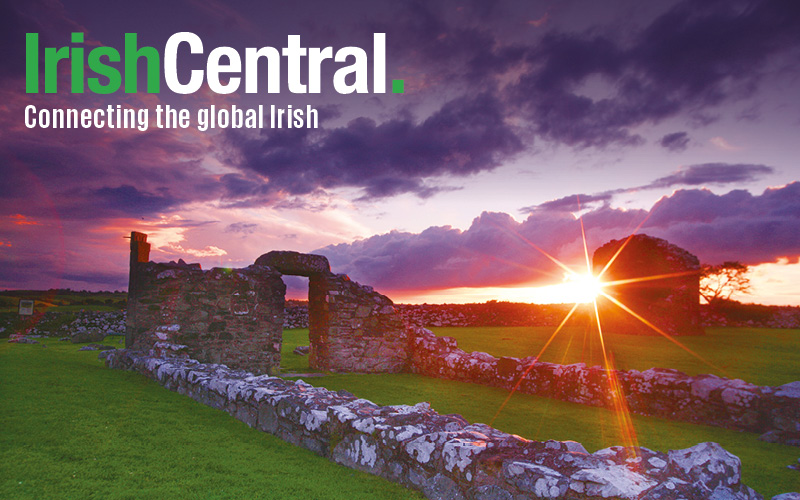| Illustration by Caty Bartholomew |
I've been up there more than 20 times, maybe 30, always in the line of reporting duties for newspapers and magazines now long gone, and it is my firm intent to climb the holy mountain again.
I put on my boots and take my pilgrim's staff and put Ciara's leather hat on my head and start off through the afternoon crowds with a light heart and step. There are thousands gathering and climbing, just like always. Nothing has changed at all.
Except me! I realize that after a while.
I am not as young as I used to be in the years I went up there like a goat. I'm still in good nick, but dammit I'm closer to 70 than any other decade marker. The holy mountain has got higher for sure.
I decide I will only go up as far as the statue of St. Patrick in the foothills, and that will do me. It is not raining, Clew Bay is beautiful during the periods when you can glimpse it through the afternoon mists.
I arrive at Patrick's cold stone toes so fresh I nearly change my mind but then remember how sharp the last stages of the climb are, even for young men, and say my prayers there, leaning on my staff, untroubled and at peace.
Two women of the traveling people pass me by barefoot. They were always a major thread in the tapestry of Reek Sunday.
The stones underfoot do not seem to hurt their tough soles. The traveling people were always religious. Nothing has changed at all.
I watch the mass of bodies climbing away up above me. I look at Patrick's austere old face.
"Saint," says I, "I don't think I'll be going any higher today than I am now. Is that all right?" I think he understood and forgave.
I ambled back down to Murrisk at the height of my ease, listening to the praying whispers of the little river traveling down with me. I'm kinda ashamed deep down at not going up to the summit but relieved too. One must adjust to the times.
Accordingly, once back at the car, I don't go into Campbell's Pub like I always did before. The drink-driving regulations are tight nowadays. One drink is no good at all if that is all you can have.
I drive away towards Galway as the colorful snake of climbers weaves its way around the bulk of The Reek. There was a deadline anyway. I had to get to Spiddal to be present for grandchild Lucy's fourth birthday.
I missed the cutting of the cake but not the party by the side of Galway Bay in Cuan and Niamh's house. The Dutch Nation was already there when I arrived.
Lucy's other grandfather is retired Dublin teacher named Kevin O'Brien, himself originally a native of Galway City. He's what you call a lovely man, gentle and learned, and he sticks me to the chair inside the hour with an informed theory he's picked up from reliable sources about this season's failure of the Galway hurlers.
The theory is that inter-club rivalry is so deeply passionate in Galway that, when the game starts to go wrong, the players revert to their club "selves" and there is not then the common purpose, focus and drive to enable them to come back from reverses.
Recent hurling history for the county supports Kevin's theory. I found it fascinating. Our Lucy was the happiest child in Connemara that evening, and sure that rubbed off on everyone.
And it is two evenings later and I'm dropping down from the Ladies View on the Caha Pass with the Dutch Nation into the town of Kenmare just after Angelus time in the evening.
The evening is golden, the Ring of Kerry has tried to prove for the past hour that it is the most scenic area of the west, (Christ but it is breathtaking!), and when we drop down into Kenmare we decide we are too hungry to go all the way down to Clonakilty.
So we stop in the center of the bright and busy town -- all the nations of the world a-walking – and we go into a pub called JB McCarthy's sometime just after seven o'clock. There is a merry air about the place, a mixed crowd that seems to include both bankers and hippies. And we order our food.
And, certainly before 7:30, live music starts from the corner, the very best and brightest. And at the same time I spot old friend Aileen Roantree at a nearby table, and she tells me the music always starts early in Kenmare and runs as long as the night runs. And she gives me the names of the musicians.
There was Dave Baker on box and banjo, Nick Urwin on bazouki, and none other than the legendary Sean Garvey in the middle.
I know Sean but I left him alone as I attacked my lamb stew with relish, and he sang ballads with his mighty voice and played the fiddle and banjo as well.
I met Paul Walsh, the man of the house, and complimented him on his lamb stew and the craic and asked him to help me slink away without Sean seeing me (which he did), because otherwise I would not be able to get out of Kenmare for two days.
And the Dutch Nation, even when enchanted like she was, never forgets that thing called The Schedule.




Comments